News
Billy’s Scene
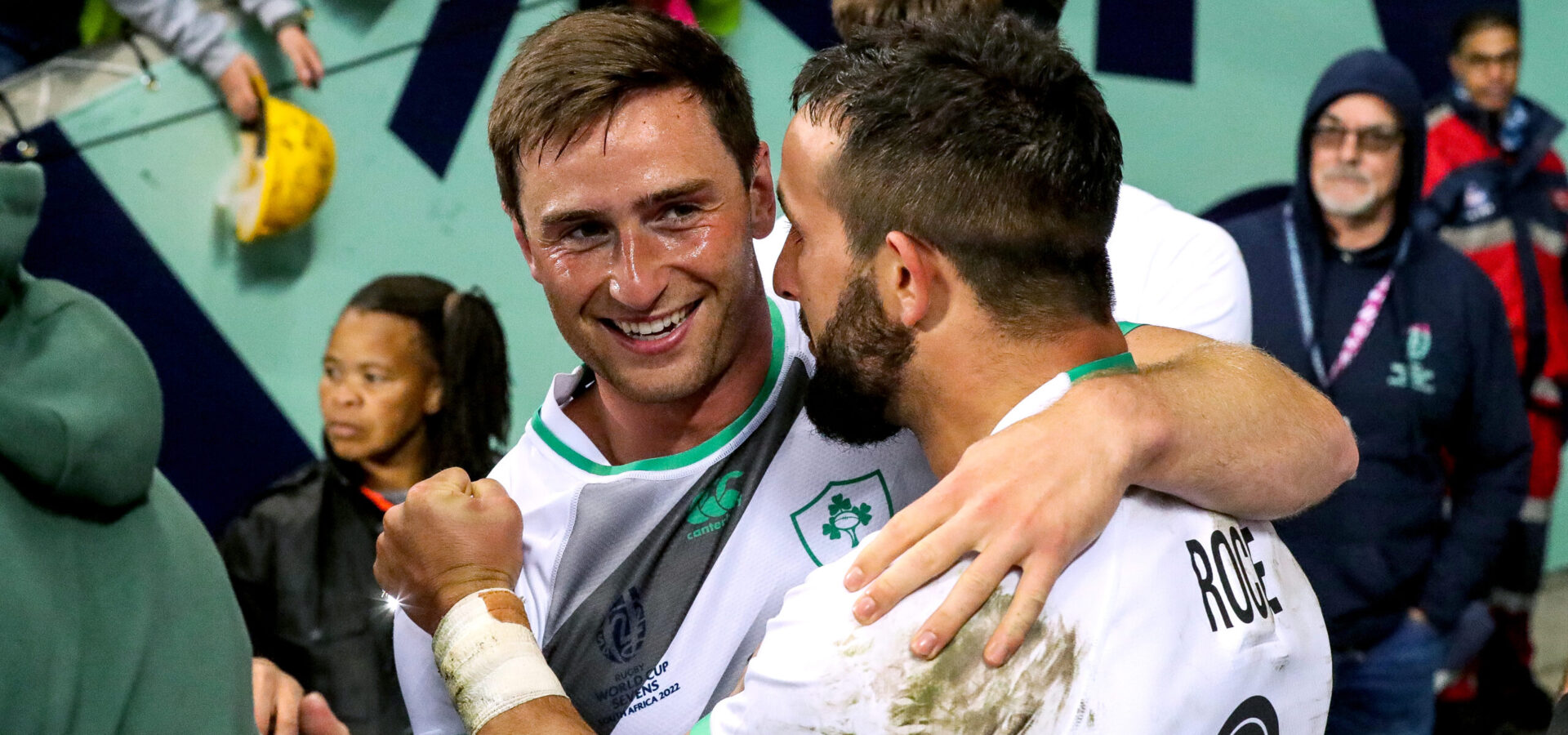
When the two lads crossed each other’s path on Pembroke Street, a mixture of trepidation and giddiness was etched across their faces. Like schoolboys on the first day of class, Billy Dardis and Terry Kennedy were bracing for the unknown.
It wasn’t quite the drama of stepping onto the Stade de France, but the stakes, to them, seemed just as high. Not sure whether to laugh or to bolt, they masked their nerves as they approached the front door of the TritonLake office before simultaneously pausing.
“Erm, Terry…” Billy began as he shifted the weight of the gear bag on his shoulder, “do you know what gym we can go to?”
The uncertainty of life after rugby had already begun to reveal itself in small, mundane moments like these.
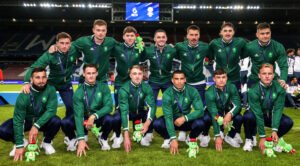
Mandatory Credit ©INPHO/Laszlo Geczo
After a contrasting few weeks, both were on a level corporate playing field now. Having captained the Irish 7s to unprecedented heights, Billy’s professional tenure came to a disappointing close as he missed out on selection for the Olympics. Kennedy, on the other hand, was still reeling from an earlier than expected exit from the tournament.
Now, rugby retirement and all the new possibilities that came with it stretched out before them. But first, day one in corporate Ireland had to be navigated.
“We were actually pretty lucky that we had each other in those first few days” Dardis reflects. “There was a lot of basic stuff we had to get to grips with and exercise, which was once part and parcel of our day, was now something we had to plan into our busy working lives.”
Almost six months into retirement, it seems Dardis has a firm grasp on things. Head of Operations & Partnerships at TritonLake, he also has a number of other interesting projects on the go.
However, it hasn’t been a complete departure. Indeed, the former Irish Men’s 7s captain has been appointed to the board of the Rugby Players Ireland Foundation, while he also ensures to meet an old teammate for a coffee every week to keep connections flowing.
Following Ireland’s Olympic journey, there are a number of his former teammates who have a bit more time for the social stuff these days. Of all teams currently on the SVNS circuit, the men’s side has experienced the greatest turnover and so the Irish 7s ‘OAP’ WhatsApp group is very active, with Dardis at the heart of it.
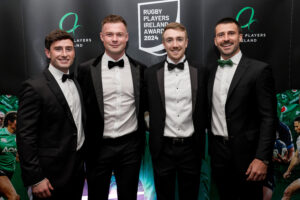
Mandatory Credit ©INPHO/Laszlo Geczo
“In fairness, I think I’ve hit the ground running,” he says. “I’m proud of the work I put into my post-rugby career while I was still playing. I got my education, built a solid network and I dipped my toes into the workplace. It has all made an enormous difference.”
That’s not to say Dardis’ experience of the transition was all roses. Despite returning to the form that saw him lead the Irish 7s for several seasons, Dardis found himself squeezed out of the final Olympics picture.
“Unfortunately, I was a bit bitter about that ending for quite a while,” Dardis confesses. “I see that in me now. I’ve tried to shut it out of my mind but I remember my last few weeks very vividly. In the final few days before the lads flew to Paris, their families were invited in to wish them well. I remember that being a quite a difficult one to navigate.
“It should have been a wonderful moment in my career but instead, I trudged away from that session with the names of my selected teammates ringing in my ears as they were each announced and celebrated.”
True to Dardis’ style, he nevertheless returned to the IRFU High-Performance Centre over the following days to help the girls prepare. He was also keen to keep his body ticking over. Just in case.
“Until the lads walked onto the pitch in that first game, I still felt there was a chance I could play. I made sure to stay fit over those last few weeks and when I was packing my bag to fly to Paris as a supporter, I threw in a pair of boots and my gumshield. I kept telling myself that anything could happen.
“Then the day they walked on, I was like ‘right, that’s done,’ and I went to order a beer.
“I have to say I enjoyed every part of the Olympics except the Irish games, if I’m honest. I felt so detached. Having been so involved over the years, I was one of thousands, millions even, looking on from the outside.
“Pretty quickly I found myself thinking that I wasn’t good enough to be out there and that made me feel even further away from it.”
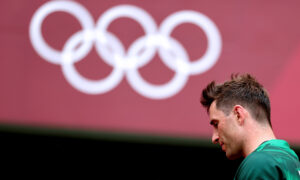
Mandatory Credit ©INPHO/James Crombie
Except Dardis doesn’t really think that. He knows that but for the bounce of a ball, he could have been. He’d still argue his case for inclusion today if given the chance. Yet, as he sat in the stands in Paris his mind had to find some kind of compromise.
“Somehow, I found the ability to look at the bigger picture and I think that was helped by the fact that I was staying with Sean Cribbin’s mum and his girlfriend’s family. Sean had actually been part of both teams that qualified for the Olympics but had missed out on selection for Tokyo before travelling as a reserve to Paris.
“A few games into the tournament, the squad began to pick up a few injuries and we caught wind that Sean might actually get to play. Between Sean’s girlfriend and I, we booked flights for his brother and sister who were back in Dublin and we got some tickets without letting on to anyone.
“It had been a difficult few years for the family. Sean’s dad passed away a few years ago and I just thought that it was at times like this that they all should be together.”
The next morning, Dardis arranged to meet the siblings at the stadium and was duly thrilled by the Cribbins’ ecstatic, albeit quizzical reactions.
“At that stage, none of them knew that Sean was about to become an Olympian, so I had to break up the excitement and hurry them along to their seats. Something special was about to happen. It was epic.”
Dardis took great satisfaction in witnessing the Cribbin family cheering Sean on along with 80,000 people in the Stade de France. With his own competitive hat on, Dardis might have found himself begrudging Cribbin his moment. Instead, he was filled with immense pride that all along he had been part of something far greater.
“I always thought highly of Sean,” Dardis says. “I remember when he was dropped ahead of Tokyo and I could barely look him in the eye. I didn’t know what to do and to this day I regret that I wasn’t able to say something… anything at all. Now that I’ve gone through it myself, I realise how much an arm around the shoulder helps.”
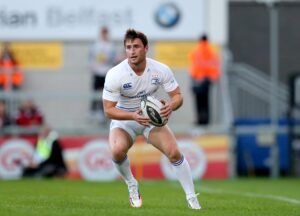
Mandatory Credit ©INPHO/Ryan Byrne
As a professional athlete, Dardis has experienced his own fair share of disappointment. A prodigious young talent, he recalls being let go from Leinster and not telling a sinner. For almost three months he ploughed on, reluctant to shatter the facade. He decided not to employ the same tact on this occasion.
“I felt I was coming good which is why I really had to battle with the decision,” he says of his non-selection for Paris. “It was difficult because I was angry and while I was experiencing one of the worst weeks of my life, my best friends were enjoying their finest.
“I tried to put on a brave face as best I could, so much so that people thought I had taken the news quite well. In actual fact, it was eating me up on the inside. Thankfully I decided not to bottle it up and I leaned on our psychologist and my family and friends for a lot of support.
“As it happened, the day after the squad was announced I had a Tackle Your Feelings Workshop. I really didn’t know if I’d have the strength to do it but it was very late in the day and I didn’t want to let anyone down.
“Looking back, I provided some really raw insights that morning. I was describing my feelings very much in the moment. It ended up being a very cathartic experience and allowed me to open the door to my emotions at the time.”
Still just 29, the closing chapters of his professional career have ensured that Dardis is happy to remain on the sidelines. A cameo at the recent Bermuda World Rugby Classic served to cement his decision after some encounters on the pitch as well as witnessing the intensity of a stacked and physical South African side featuring Willem Alberts, Zane Kirchner, JJ Engelbrecht and Ruan Pienaar.
Yet despite the circumstances surrounding his 7s exit, Dardis counts himself lucky. He’s aware that there are many players in the system who simply don’t have the option of retiring. Despite waning powers, a mental check-out or niggling injuries, they have nothing to turn to, something he feels responsible to help change.
More recently, Dardis has found increased clarity and closure. He is relishing his new purpose which has allowed him greater freedom to reflect and cherish a unique Irish career in green. He is also grateful to have had the opportunity to say goodbye to the game on the grandest of stages.
“The World Rugby Awards in Monaco was a peak moment for me really,” he beams. “Harry [McNulty] and I were there as guests and not to pick up any awards and so we were determined to enjoy ourselves. It’s not every day you can have cocktails over lunch in Monaco!
“Next thing we see Eddie Jordan across the road whilst watching a cycling race around the harbour, and he beckoned us over. He was a lovely man and as a big rugby fan he was very interested in our careers. He ended up inviting us to a pub nearby to watch Australia play Scotland.
“Anyways, we had to race back to the hotel that evening to get ready for the Awards ceremony. We caught up with Terry, Erin [King], Aoife [Wafer] and as we entered the event, all the Irish crew were sent to a table at the top of the room.
“I thought it was a joke when I was sent in the opposite direction. Table 53 or something. I had briefly forgotten I wasn’t there as a member of the Irish 7s. I had been invited to represent the Global Rugby Players Foundation.

“As I made my way through the room I saw Eddie talking to Brian O’Driscoll and so I veered in their direction before realising they were actually at my table along with George Gregan, Victor Matfield, John Eales, Sergio Parisse, Alan Wyn-Jones, Dan Biggar and Ken Owens. I spent the night literally star struck.
“Granted, it’s not the pinnacle of the game per se but as I watched the best players in the world receive their awards while sitting at a table full of rugby royalty, I had to admit that I thought about an 8-year-old Billy Dardis.
“And I think he would have been very proud.”
Back to NewsLatest Posts

Player Development Programme Review

Finding Hope

Highlights: February 2025
















